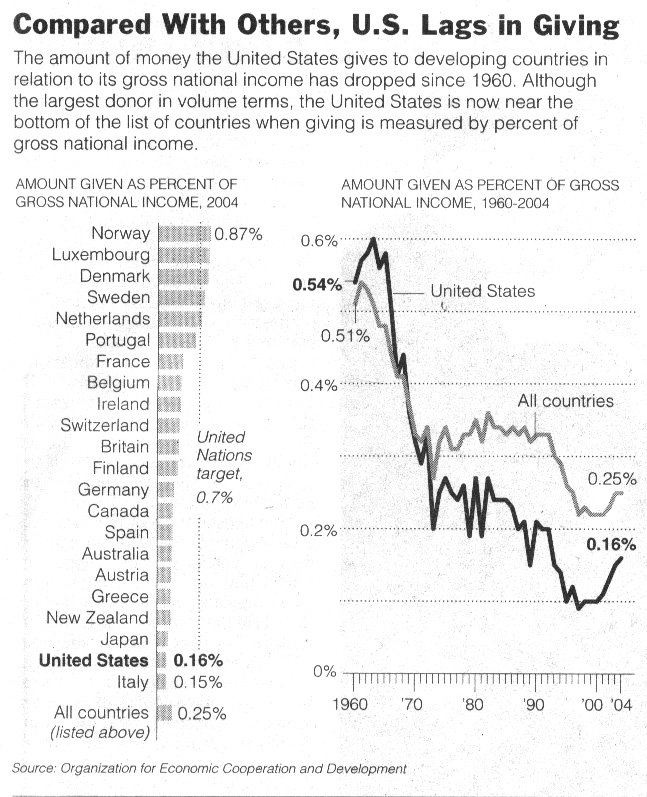We gave 15 cents [per day per person] for every $100 of national income to poor countries. Denmark gave 84 cents, the Netherlands gave 80 cents, Belgium gave 60 cents, France gave 41 cents, and Greece gave 21 cents (that was the lowest share, beside our own).
It is sometimes said that Americans make up for low official aid with private charitable donations. Nope. By OECD calculations, private donations add 6 cents a day to the official U.S. figure -- meaning that we still give only 21 cents a day per person.
Source: "Land of Penny Pinchers" by Nicholas D. Kristof - New York Times - 1/5/04
Three years ago [2002], President Bush created the Millennium Challenge Account to give more money to poor countries that are committed to policies promoting development. For the third straight year, Mr. Bush has committed a lot less than he promised. Michael Phillips of The Wall Street Journal reports that M. Bush said he would ask Congress for $1.7 billion in 2004; he asked for $1.3 billion and got $1 billion. He said he would ask for $3.3 billion in 2005; he asked for 2.5 billion and got 1.5 billion.
The program…has yet to pay out a single dollar. Officials at the Millennium Challenge Account are quick to list the countries that, through good governance, have qualified for the aid program. They are not as quick to list the countries that have received a dime: there aren't any.
Source: "America's Promises" - New York Times - 1/28/05
A lot of the money that we spend on developing countries actually goes to American companies that do contract work in the developing countries. The developing countries get infrastructure that largely benefit the few wealthy people in those countries, while American corporations reap windfall profits from these construction projects.
Meanwhile large majorities of the populations of these developing countries remain desperately poor and the disparity of wealth in their countries increases. Dams supply the wealthy with electricity while river flow that provides irrigation for small subsistence farms is disrupted. Hospitals provide health care for the elites while the poor die in droves from preventable diseases.
In return for this development aid, developing countries find themselves saddled with unmanageable debt to the U.S. and the World Bank. This debt forces the governments of these developing countries to acquiesce to the demands of the U.S. when soldiers are needed for a "coalition of the willing," when land is needed for a military base or when cheap resources like oil are needed by the insatiable U.S. consumer society.
Source:
President Bush's signature foreign aid program was created to transform the economies of some of the world's poorest countries, but as John J. Danilovich, a businessman and former ambassador, took over its leadership this week, his first challenge was to change its reputation for moving at the plodding pace of an ox cart.
The Millennium Challenge Corporation has spent only 2 percent of the $2.5 billion appropriated in its first two years and has signed agreements with only five countries for less than half the total. Republican leaders in Congress just this week almost halved the president's $3 billion request for next year.
The agency's prospects now depend on whether Mr. Danilovich, a longtime Bush friend and political supporter. He also has to overcome skepticism among development specialists and advocates about whether he has the skill to do the job. He acknowledges that he has no experience with poverty issues in Africa and has not been directly involved with development assistance.
He spent about 20 years in the maritime industry, based in London, and organized American voters living there for Mr. Bush and his father. Mr. Danilovich and his family contributed $21,425 to Republican candidates and party committees from 1999 until he became ambassador to Costa Rica in 2001, according to the Center for Responsive Politics, a nonpartisan research group.
Source: "Foreign Aid Chief Pledges Reforms" By CELIA W. DUGGER - NY Times - November 13, 2005

Source: